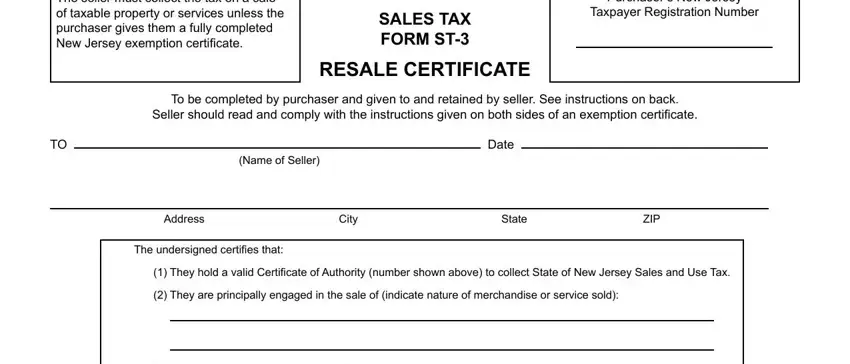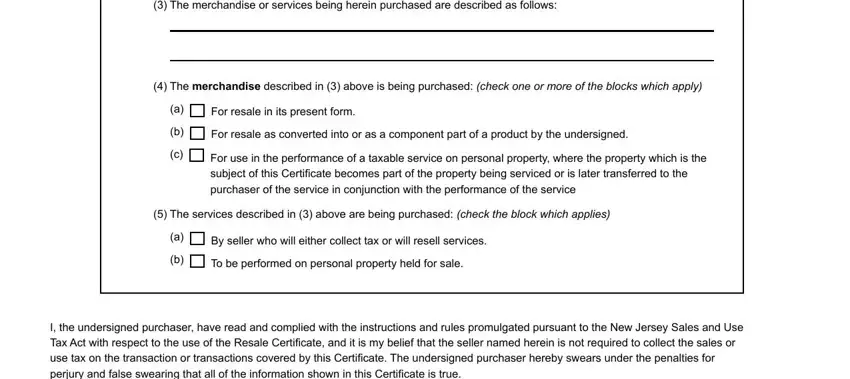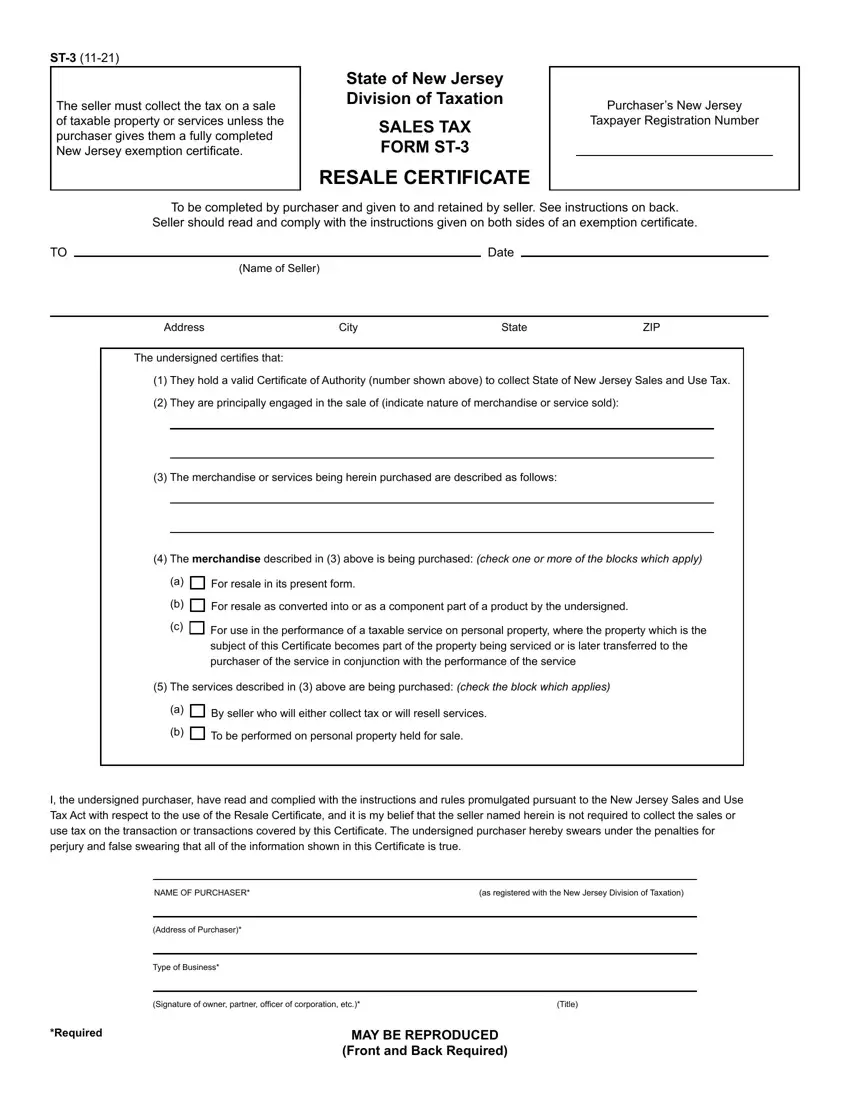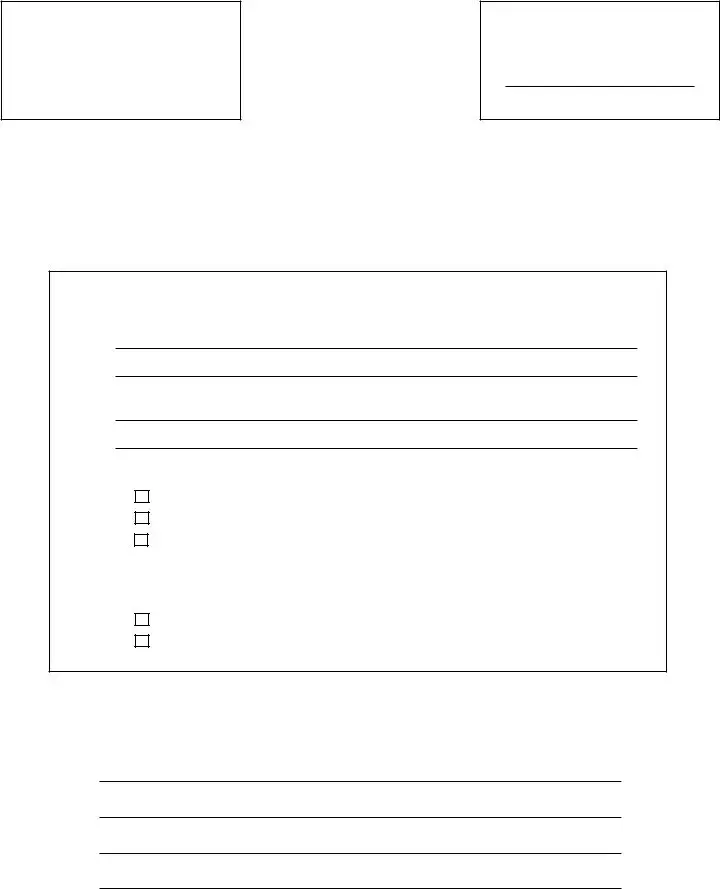INSTRUCTIONS FOR USE OF RESALE CERTIFICATES – ST-3
1.Registered sellers who accept fully completed exemption certificates within 90 days subsequent to the date of sale are relieved of liability for the collection and payment of sales tax on the transactions covered by the exemption certificate. The following information must be obtained from a purchaser in order for the exemption certificate to be fully completed:
•Purchaser’s name and address;
•Type of business;
•Reason(s) for exemption;
•Purchaser’s New Jersey tax identification number or, for a purchaser that is not registered in New Jersey, the
Federal employer identification number or out-of-State registration number. Individual purchasers must include their driver’s license number
•If a paper exemption certificate is used (including fax), the signature of the purchaser.
The seller’s name and address are not required and are not considered when determining if an exemption certificate is fully completed. A seller that enters data elements from paper into an electronic format is not required to retain the paper exemption certificate.
The seller may, therefore, accept this certificate as a basis for exempting sales to the signatory purchaser and is relieved of liability even if it is determined that the purchaser improperly claimed the exemption. If it is determined that the purchaser improperly claimed an exemption, the purchaser will be held liable for the nonpayment of the tax.
2.Retention of Certificates - Certificates must be retained by the seller for a period of not less than four years from the date of the last sale covered by the certificate. Certificates must be in the physical possession of the seller and available for inspection.
3.Acceptance of an exemption certificate in an audit situation - On and after October 31, 2011, if the seller either has not obtained an exemption certificate or the seller has obtained an incomplete exemption certificate, the seller has at least 120 days after the Division’s request for substantiation of the claimed exemption to either:
1.Obtain a fully completed exemption certificate from the purchaser, taken in good faith, which, in an audit situation, means that the seller obtain a certificate claiming an exemption that:
(a)was statutorily available on the date of the transactions, and
(b)could be applicable to the item being purchased, and
(c)is reasonable for the purchaser’s type of business; OR
2.Obtain other information establishing that the transaction was not subject to the tax.
If the seller obtains this information, the seller is relieved of any liability for the tax on the transaction unless it is discovered through the audit process that the seller had knowledge or had reason to know at the time such information was provided that the information relating to the exemption claimed was materially false or the seller otherwise knowingly participated in activity intended to purposefully evade the tax that is properly due on the transaction. The burden is on the Division to establish that the seller had knowledge or had reason to know at the time the information was provided that the information was materially false.
4.Additional Purchases by Same Purchaser - This certificate will serve to cover additional purchases by the same purchaser of the same general type of property. However, each subsequent sales slip or purchase invoice based on this Certificate must show the purchaser’s name, address and New Jersey, Federal, or out of state registration number for your purpose of verification.
5.Retention of Certificates - Certificates must be retained by the seller for a period of not less than four years from the date of the last sale covered by the certificate. Certificates must be in the physical possession of the seller and available for inspection on or before the 90th day following the date of the transaction to which the certificate relates.
EXAMPLES OF PROPER USE OF RESALE CERTIFICATE
a. A retail household appliance store owner issues a Resale Certificate when purchasing household appliances from a supplier for resale. b. A furniture manufacturer issues a Resale Certificate to cover the purchase of lumber to be used in manufacturing furniture for sale.
c. An automobile service station operator issues a Resale Certificate to cover the purchase of auto parts to be used in repairing customers cars.
EXAMPLES OF IMPROPER USE OF RESALE CERTIFICATE
In the examples below, the seller should not accept Resale Certificates, but should insist upon payment of the sales tax. a. A lumber dealer can not accept a Resale Certificate from a tire dealer who is purchasing lumber for use in altering their premises.
b. A distributor may not issue a Resale Certificate on purchases of cleaning supplies and other materials for their own office maintenance, even though they are in the business of distributing such supplies.
c. A retailer may not issue a Resale certificate on purchases of office equipment for their own use, even though they are in the business of selling office equipment.
d. A supplier can not accept a Resale Certificate from a service station owner who purchases tools and testing equipment for use in their business.
REPRODUCTION OF RESALE CERTIFICATE FORMS: Private reproduction of both sides of Resale Certificates may be made without the prior permission of the Division of Taxation.
FOR MORE INFORMATION: Read publication S&U-6 (Sales Tax Exemption Administration).
https://www.state.nj.us/treasury/pdf/pubs/sales/su6.pdf
DO NOT MAIL THIS FORM TO THE DIVISION OF TAXATION






